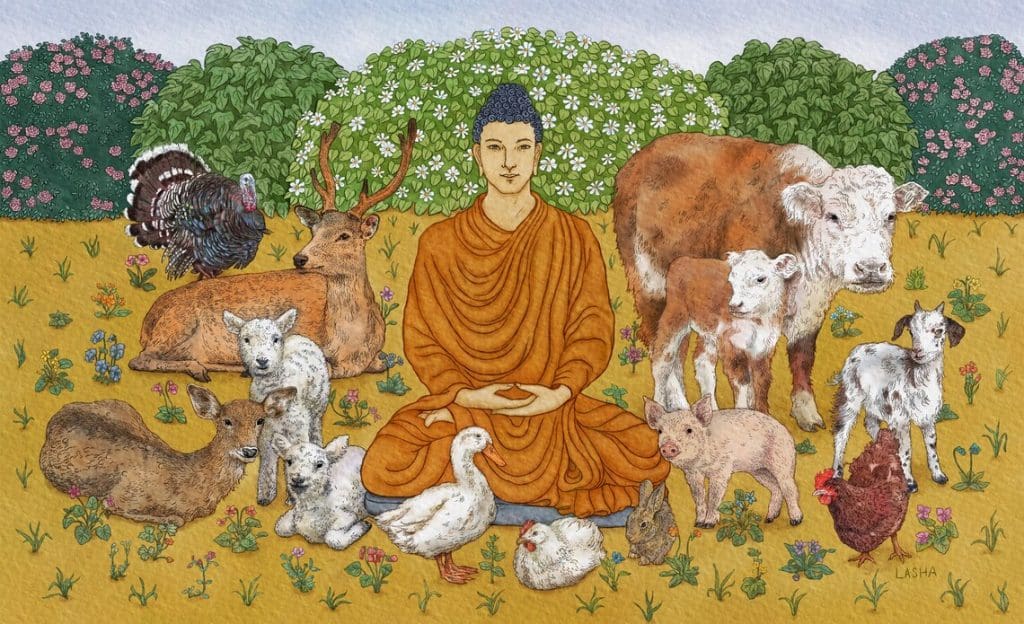Religion and spirituality have profoundly influenced how humans perceive and treat animals, offering timeless teachings that advocate compassion, empathy, and non-violence. Across traditions like Hinduism’s *ahimsa*, Buddhism’s loving-kindness, Jainism’s strict vegan ethics, or Christianity’s stewardship of creation, these principles encourage ethical choices that honour the sanctity of all living beings. By embracing practices such as vegetarianism or veganism inspired by spiritual values, individuals can align their actions with beliefs that promote kindness towards animals. This article examines the intersection of faith and animal welfare, highlighting how spiritual teachings inspire a more compassionate approach to our shared existence with sentient creatures
The relationship between humans and animals is one that dates back to the earliest forms of civilization. For centuries, animals have played a crucial role in human lives, from providing food and labor to companionship and protection. Despite this long-standing relationship, there has been a growing concern for the ethical treatment of animals in recent years. Issues such as animal cruelty, factory farming, and endangered species have brought to light the importance of compassion towards animals. In this discourse, the role of religion and spirituality in promoting compassion towards animals has gained prominence. Religion and spirituality have been a significant force in shaping cultural attitudes and beliefs, and their influence on the treatment of animals cannot be overlooked. This article will delve into the various ways in which religion and spirituality have played a crucial role in promoting compassion towards animals, and how they continue to shape our attitudes and behaviors towards these sentient beings. From teachings of kindness and empathy to the practice of ethical veganism, the impact of religion and spirituality on promoting compassion towards animals is a topic that warrants further exploration and discussion.

Religious perspectives on animal compassion
Many religious and spiritual traditions emphasize the importance of compassion towards all living beings, including animals. Exploring how various religious and spiritual traditions view vegetarianism/veganism as an expression of compassion and non-violence towards all living beings can provide valuable insights. For example, in Hinduism, the concept of ahimsa (non-violence) encourages adherents to avoid causing harm to any living creature. This belief is often manifested through vegetarianism or veganism, as it aligns with the principle of non-violence. Similarly, Buddhism promotes the idea of loving-kindness and compassion for all sentient beings, which has led to the widespread practice of vegetarianism among Buddhist communities. In Jainism, the concept of ahimsa is taken to the extreme, with followers adopting a strict vegan lifestyle to avoid causing harm to even the tiniest of organisms. These examples highlight how religious and spiritual perspectives can play a vital role in promoting compassion towards animals through dietary choices and ethical practices.
Veganism as a spiritual practice
Exploring how various religious and spiritual traditions view vegetarianism/veganism as an expression of compassion and non-violence towards all living beings, we can understand that veganism holds a significant place as a spiritual practice. For many individuals, adopting a vegan lifestyle goes beyond dietary choices and becomes a deeply spiritual endeavor. Veganism is seen as a way to align one’s actions with the principles of compassion, kindness, and respect for all sentient beings. It is believed that by abstaining from the consumption of animal products, individuals can cultivate a deeper sense of connection with the natural world and the inherent value of all living creatures. Moreover, veganism as a spiritual practice often extends to other aspects of life, such as ethical clothing choices, sustainable living practices, and promoting environmental conservation. By embracing veganism as a spiritual path, individuals strive to live in harmony with their beliefs and contribute to a more compassionate and sustainable world.
Non-violence and dietary choices
The concept of non-violence extends beyond our interactions with other human beings and encompasses our dietary choices as well. Many religious and spiritual traditions emphasize the importance of non-violence towards all living beings, which extends to the food we consume. By consciously choosing a vegetarian or vegan diet, individuals can demonstrate their commitment to non-violence and compassion towards animals. This dietary choice reflects a deep understanding and appreciation for the interconnectedness of all life forms and the belief that every creature deserves to be treated with kindness and respect. Such dietary practices not only promote personal well-being but also contribute to a more harmonious and compassionate world.
Exploring the concept of ahimsa
Exploring how various religious and spiritual traditions view vegetarianism/veganism as an expression of compassion and non-violence towards all living beings, the concept of ahimsa emerges as a central theme. Ahimsa, meaning non-violence or non-harming, is a fundamental principle found in religions such as Jainism, Hinduism, and Buddhism. These traditions teach that by abstaining from the consumption of animal products, individuals can align their actions with the principle of ahimsa and cultivate a deeper sense of compassion and respect for all sentient beings. The practice of ahimsa challenges individuals to reflect upon the interconnectedness of life and the ethical implications of their dietary choices. By embracing vegetarianism or veganism, individuals not only nourish their bodies but also contribute towards a more sustainable and compassionate world, promoting the well-being of both humans and animals alike.
Religion’s influence on animal rights
Religion’s influence on animal rights extends beyond the promotion of vegetarianism or veganism as an expression of compassion and non-violence. Many religious and spiritual traditions emphasize the inherent value and worth of all living beings, including animals, and advocate for their ethical treatment. For example, in Christianity, the concept of stewardship is highlighted, emphasizing the responsibility humans have to care for and protect God’s creation, which includes animals. Some religious texts explicitly condemn animal cruelty and promote kindness towards animals. Additionally, religious rituals and practices often involve considerations for the welfare and treatment of animals, further highlighting the importance of respecting their rights. These religious teachings and practices can play a significant role in shaping individuals’ attitudes and behaviors towards animals, fostering a sense of empathy and advocating for their well-being. The influence of religion on animal rights goes beyond individual beliefs and can also influence societal norms and legislation, contributing to the establishment of legal protections for animals and the recognition of their rights in various jurisdictions around the world.
The role of compassion in spirituality
Exploring how various religious and spiritual traditions view vegetarianism/veganism as an expression of compassion and non-violence towards all living beings, it becomes evident that compassion occupies a central role in spirituality. Compassion, characterized by empathy and a deep concern for the suffering of others, is often understood as a fundamental spiritual principle that guides individuals towards a more compassionate and ethical way of life. In many spiritual traditions, the practice of compassion extends not only to fellow humans but also to animals, recognizing their inherent worth and deserving of our care and respect. By cultivating compassion towards all living beings, individuals are encouraged to extend their circle of empathy and actively contribute to creating a more compassionate and harmonious world. This understanding of compassion serves as a guiding principle for individuals on their spiritual journey, fostering a deeper connection with the natural world and encouraging ethical choices aligned with the values of love, kindness, and non-violence.
Breaking down barriers with empathy
Breaking down barriers with empathy is a powerful tool that can bridge the gaps between individuals and foster understanding and compassion. In the context of promoting compassion towards animals, empathy plays a crucial role in creating a connection between humans and the animal kingdom. By putting ourselves in the shoes of animals, we can better understand their experiences, emotions, and vulnerabilities. This empathetic understanding allows us to break down the barriers that separate us and encourages us to treat animals with kindness and respect. When individuals approach the topic of vegetarianism/veganism through the lens of empathy, they are more likely to acknowledge the suffering of animals in the food industry and make conscious choices that align with their values of compassion and non-violence. By embracing empathy as a guiding principle, we can overcome societal barriers and work towards a more compassionate world where animals are treated with the care and consideration they deserve.

Promoting a kinder world together
Exploring how various religious and spiritual traditions view vegetarianism/veganism as an expression of compassion and non-violence towards all living beings is an essential step in promoting a kinder world together. Many religious and spiritual teachings emphasize the interconnectedness of all living beings and emphasize the importance of showing compassion and respect to every creature. By delving into these teachings, we can discover the common threads that unite different faiths in their call for ethical and sustainable dietary choices. This exploration not only deepens our understanding of these traditions but also provides a powerful platform for promoting compassion towards animals on a global scale. By working together, individuals from diverse religious and spiritual backgrounds can amplify their voices and create a collective impact in fostering kindness and empathy towards all living beings. Ultimately, by embracing the principles of compassion and non-violence, we have the potential to create a world where the well-being of animals is at the forefront of our actions and decisions.
In conclusion, the role of religion and spirituality in promoting compassion towards animals cannot be underestimated. These belief systems have long emphasized the importance of treating all living beings with kindness and respect, and this extends to the treatment of animals. By embracing these principles and incorporating them into our daily lives, we can create a more compassionate and harmonious world for both humans and animals alike. Let us continue to reflect on the teachings of our faiths and strive towards a more empathetic and compassionate society.

4.1/5 - (37 votes)



